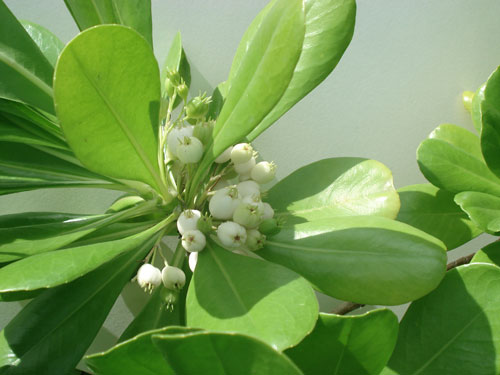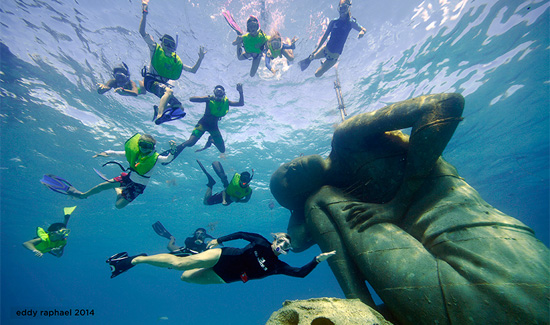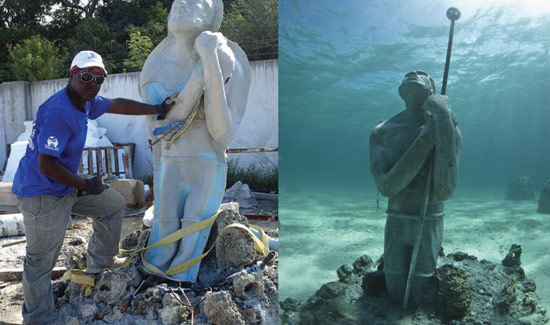
The Coastal Awareness Committee of The Bahamas, a group of stakeholders from the private and public sectors with an interest in promoting the sustainable development of The Bahamas, has announced the focus for their campaign in 2013 – the effects that Invasive Species have on our coastal environment.
“Invasive species, both marine and terrestrial, are affecting our coastal zones throughout The Bahamas,” said Earlston McPhee, Chairman of the Coastal Awareness Committee and Director, Sustainable Development for the Ministry of Tourism.
“There is a silent war going on in The Bahamas, one that leaves many animals and plants negatively impacted. Invasive Species quickly establish themselves as the dominant species and can destroy our native ecosystems. If we are not pro-active, these environmental invaders could forever change our coastal environment. Our goal is to educate the public and to offer real solutions to people that collectively will help us as a developing country and as a tourist destination. We hope to bring more awareness about invasive species and ask the public to participate in our activities.”
The National Coastal Awareness Committee has increased the number of activities scheduled for April which is officially National Coastal Awareness Month in The Bahamas. The public is invited to participate.
The Committee will host, in collaboration with its strategic partners both in the public and private sectors the following: national Public Service Announcement campaigns on television and radio; erection of banners throughout participating islands in The Bahamas, a school PSA competition with the theme – Our Bahamas.
Our Native Plants and a submission deadline of May 3rd; Fun/Run/Walk along the coast; field trips with Dolphin Encounters on Blue Lagoon Island, Dive Stuart Cove and BREEF, have been arranged to provide students with an opportunity to learn about protecting the coasts and enjoy the marine wonders of the Bahamas.
In addition, the Committee will meet with relevant government ministries on courtesy calls and will continue their efforts in removing derelict vessels from waterways. As this is a national initiative, Beach clean-ups and other Coastal Awareness activities are planned for the islands of Abaco, Andros, Bimini, Eleuthera, Exuma and Cat Island.
The 2013 Coastal Awareness Committee includes members from the following organizations:
Ministry of Tourism
Bahamas Environment Science and Technology Commission (BEST)
Bahamas Hotel Association
Bahamas National Trust
Bahamas Reef Environment Educational Foundation (BREEF)
Broadcasting Corporation of The Bahamas
College of The Bahamas
Department of Environmental Health Services
Department of Marine Resources
Dive Stuart Cove
Dolphin Encounters Ltd.
The Nature Conservancy
Ministry of Education, Science and Technology
Port Department
The College of The Bahamas
The University of The West Indies
“Our coastal and marine resources help shape our nation’s character and its distinctive personality,” adds Mr. McPhee.
“All beneficiaries of the tourism industry must take an interest and active role in conserving our natural resources, particularly in growing Small Island Developing States (SIDS) like The Bahamas. As we depend on the tourism industry the economic sustainability of The Bahamas hinges on our ability to maintain the natural beauty of these islands that attracts millions to our shores.
“We thank each of our corporate sponsors who continue to support and contribute to this worthwhile effort. We also ask the public to participate in our upcoming events as we strive to sustain the natural beauty of these islands for our socio-economic welfare and that of our guests.
“We are all in this together and as our motto states ‘If not us…Who? If not Now…When?’”
For more information on National Coastal Awareness month visit www.coastalawareness.org or the National Coastal Awareness Facebook page. To become a sponsor please contact Earlston McPhee at 356-6963/67/38.
Source: Kelly Meister
Everyone can help protect our country from invasive species.
Plant a native tree!
By becoming aware of what the species look like and how they spread, we can make better choices in the types of plants to grow and spread in our yards.
Remove Invasive Plants
Growing fruits and vegetables in our gardens and asking our local nurseries for only native plants is a great start. Another step is to eradicate any and all invasives whenever possible. When we uproot and destroy these plants we can limit how fast they continue to spread and hopefully save some native organisms.
Learn About Lionfish
When it comes to the invasive lionfish, this animal can and should be netted, speared or reported to the Department of Marine Resources whenever seen in the water. Once the dorsal, pelvic and anal spines are removed they are safe to handle and quite delicious to eat! By encouraging Bahamians to purchase lionfish from local fisherman and learn exciting ways to cook them, we will be helping to protect our coasts. Let’s decrease their numbers in our waters by eating more lionfish!



